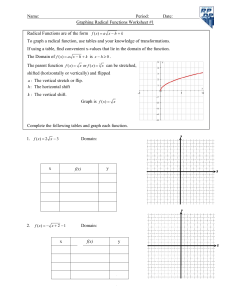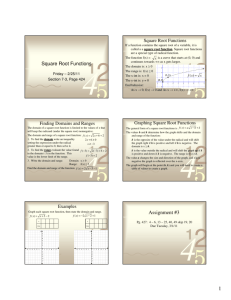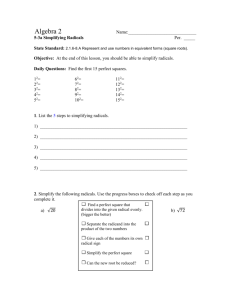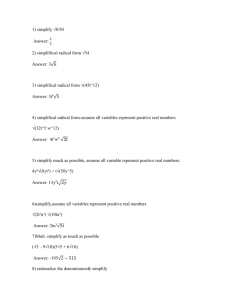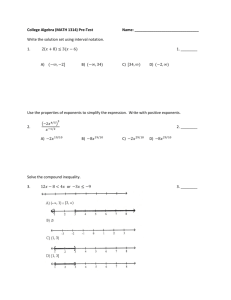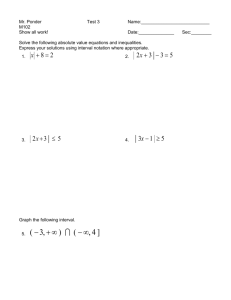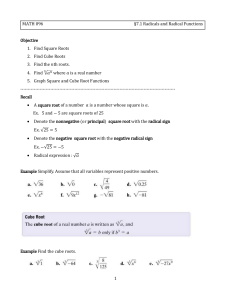Pre-AP Precalculus Summer Packet 2015
advertisement
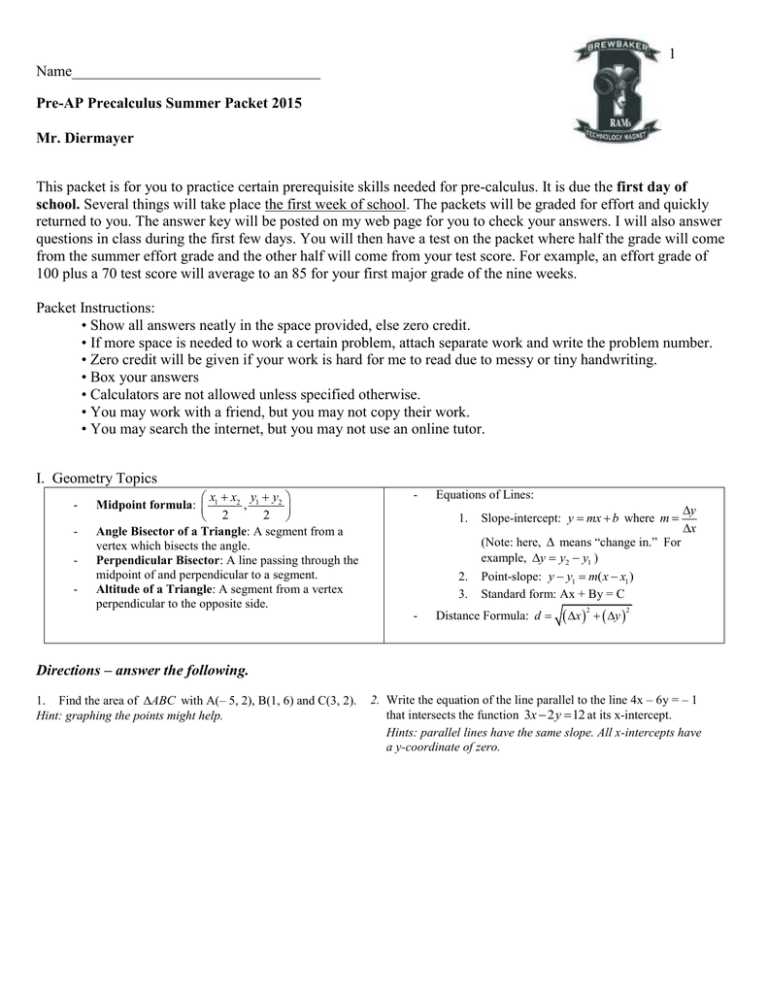
1
Name_________________________________
Pre-AP Precalculus Summer Packet 2015
Mr. Diermayer
This packet is for you to practice certain prerequisite skills needed for pre-calculus. It is due the first day of
school. Several things will take place the first week of school. The packets will be graded for effort and quickly
returned to you. The answer key will be posted on my web page for you to check your answers. I will also answer
questions in class during the first few days. You will then have a test on the packet where half the grade will come
from the summer effort grade and the other half will come from your test score. For example, an effort grade of
100 plus a 70 test score will average to an 85 for your first major grade of the nine weeks.
Packet Instructions:
• Show all answers neatly in the space provided, else zero credit.
• If more space is needed to work a certain problem, attach separate work and write the problem number.
• Zero credit will be given if your work is hard for me to read due to messy or tiny handwriting.
• Box your answers
• Calculators are not allowed unless specified otherwise.
• You may work with a friend, but you may not copy their work.
• You may search the internet, but you may not use an online tutor.
I. Geometry Topics
-
x x y y2
Midpoint formula: 1 2 , 1
2
2
Angle Bisector of a Triangle: A segment from a
vertex which bisects the angle.
Perpendicular Bisector: A line passing through the
midpoint of and perpendicular to a segment.
Altitude of a Triangle: A segment from a vertex
perpendicular to the opposite side.
-
Equations of Lines:
1.
Slope-intercept: y mx b where m
(Note: here, means “change in.” For
example, y y2 y1 )
2.
3.
-
y
x
Point-slope: y y1 m( x x1 )
Standard form: Ax + By = C
Distance Formula: d
x y
2
2
Directions – answer the following.
1. Find the area of ABC with A(– 5, 2), B(1, 6) and C(3, 2).
Hint: graphing the points might help.
2. Write the equation of the line parallel to the line 4x – 6y = – 1
that intersects the function 3x 2 y 12 at its x-intercept.
Hints: parallel lines have the same slope. All x-intercepts have
a y-coordinate of zero.
2
3.
Write the equation of the line through 2, 4 and
4.
perpendicular to x 2 y 7 .
5.
Find the value of “a” if a line containing the point a, 3a
has a y-intercept of 7 and a slope of
Given the distance between x,1 and 2,5 is 2 7 ,
find the value(s) of x. Leave your answer in simplified
exact form.
6.
2
.
3
Write an equation of the line in slope-intercept form with
x-intercept of –3 and a y-intercept of –5.
II. Quadratics/Polynomials
Factoring—Strategies to try when factoring:
-
Look for a common factor
Difference of two squares: a2 b2 a b a b
-
Perfect square trinomial: a 2 2ab b 2 a b
-
Factorable trinomial (Master Product)
Directions - Factor completely each of the following:
2
-
Guess and Check
Grouping
Sum/Difference of Cubes
a b a
ab b
o
a3 b3 a b a2 ab b2
o
a3 b3
2
2
3
7] 4x 27 x 35
8] 28 y 7t
9] x3 2x2 9x 18
10] 8a4 27ab3
2
2
2
Directions - Solve each of the following:
11] 3x2 5x 12 0
12] 3x2 5x 6
13] x2 2x 3 0
14] 225 b 2 0
III. Exponents
Directions - Simplify using only positive exponents.
Properties:
a m a n a m n
a 0 1, a 0
an
p
a
81
15]
64
3x
2
17]
1
2
1
6 x 3
r
a
m
a
am
a
b
bm
1
r
p
a mn
m
1
an
n
a
b
ap
m
16]
27
18]
2 2
2
r ap
am
a mn
an
m
bm
b
m
a
a
1
3
r
a nb n a n c m
n
cm
b
4
19]
35 310
32
21] 13 y 1
20]
4
1
21
2
22] 8 1 8
IV. Graphing:
Directions - Graph each of the following using intercepts and extra points as needed to sketch a nice graph.
23] y 2 x 9 4
24] y
1
x 42 8
2
5
25] x 3 y 6
26] y =
y 2x2 6
V. Rational Expressions
Directions - Simplify to a single fraction or expression:
27]
1
2
2
ab b
28]
x 2 6x 8
x2 4
29]
x
1
x 1
x2
x
30]
x 1
x 1
31]
x 2x
4 3
32]
3x 1
2
x
x 1
VI. Simplifying Radicals
To Simplify a radical:
- find the largest perfect square which will divide evenly into the number under your radical sign.
- If the number under your radical cannot be divided evenly by any of the perfect squares, your radical is already in simplest
form and cannot be reduced further.
You should be able to do the following operation in your head.
6
Example: 48
- write the number appearing under your radical as the product (multiplication) of the perfect square and your answer from
dividing.
-
48 16 3
give each number in the product its own radical sign.
-
48 16 3 16 3
reduce the "perfect" radical which you have now created.
48 16 3 16 3 4 3
-
you now have your answer; 4
3
Directions – Simplify each of the radicals, if possible.
33]
27
34] 3 128
36]
x 2 64
37] 3 27
39]
35]
45
9
38]
18 8
10 50
5
VII. Solving Rational & Radical Equations
Solve the equations below and check for extraneous solutions.
40]
42]
10
15
=
x 4 4x 4
11x 3 – 2x = 0
41]
10
4
5
+
=
x 2x
x
x2
2
43]
10 x – 2 5 x 25 = 0
7
VIII. Domain & Range of a Function
Domain of a function f (x) : the values of x that yield a real y value. Answer the question; Can x be positive, negative, and/or zero?
2
Ex1) f ( x)
. Domain: ,3, 3, note: x = 3 is not in the domain because it causes the denominator to be zero.
x3
Ex2) f ( x) x . Domain: [0, ) note: you can’t take the square root of a negative number and generate a real y value.
f ( x) 1,2, 2,3, 5,2, 6,7 . Domain: x = 1, 2, 5, 6
Ex3)
Range of a function f (x) : the set of all y values that correspond to domain values. Use the domain values to build a t-chart, then
look for a pattern of y values to determine the range.
2
Ex1) f ( x)
. Range: ,0, 0,
x3
Ex2) f ( x) x . Range: [0, )
f ( x) 1,2, 2,3, 5,2, 6,7 . Range: y = 2, – 3, 7
Ex3)
Directions: Find the Domain of the following.
45] g(x) = – x – 9
44] f(x) = x2
47] r(x) =
x 1
48] f(x) =
46] k(x) =
2x 1 + 6
49] y =
x4
x4
x 2
x 2x 2
IX. Arithmetic Combinations of Functions & Function Composition
The Rules:
Adding two functions;
[f + g]x = f(x) + g(x)
For some value of x = a
[f + g]a = f(a) + g(a)
Subtracting two functions;
[f – g ]x = f(x) – g(x)
[f – g ]a = f(a) – g(a)
Multiplying two functions;
[fg]x = f(x)g(x)
[fg]a = f(a)g(a)
Dividing two functions;
f
f ( x)
x =
g ( x)
g
f
f (a)
a =
g (a)
g
Composing two Functions
[f o g]x = f( g(x)); substitute the g expression wherever you see an x in f(x)
[g o f]x = g( f(x)); substitute the f expression wherever you see an x in g(x)
[f o f]x = f( f(x)); substitute the f expression wherever you see an x in f(x)
[g o g]x = g( g(x)); substitute the g expression wherever you see an x in g(x)
A]
For problems # 54 – 62; Given f(x) = 7 – x2 and g(x) = x – 4 , evaluate the following.
50] f (– 4)
51] gf (– 4)
52] f (g (– 2))
8
53] f (4a)
54] f (t + 1)
55] f (g(x))
56] g (f(3))
57] [g ○ f ](5)
58] f (–x)
Directions: Evaluate each of the functions at the indicated value of x. .
For problem # 63 – 68; If
59]
f ( x) 3,5, 2,4, 1,7 , g ( x) x 3 , h( x) 3,2, 4,3, 1,6 , and k ( x) x 2 5
f h1 =
60]
g k 5 =
61]
g k (7) =
Directions: Construct each of the functions. .
62]
k g (x)
B]
For problems 69 – 74, evaluate the piecewise function
x 2
f ( x) x 2
x2
63]
when
64] kg(x)
1
=
g ( x)
8 x 2
2 x 2
2 x 10
f(–5)
65] f (0)
66] f (4)
67]
68] f (1/2)
69] f (– 7.7)
70] f ( – 2)
__________________________________________________________________________________________________________
X. Logarithms
Given log b a x if and only if b x a , where b 0 , but b 1 and a 0
Directions: - Solve for x.
71] 3 log 2 x 12
72] log 5 125 x
9
73] 3 4 log x 4 5
74]
3
log 27 ( x 5) 1
2
XI. Miscellaneous Problems:
Evaluate or Simplify the following.
75]
– 52
76]
1
1/ 2
Simplify or Rewrite the following, if possible.
77]
x8
8
78]
8
x8
79]
6x 6
2x 2
80]
x 1
x
State the coefficient of x.
81]
x
7
82] 4 –
2
x
5
83] Write the equation of a polynomial that has the given intercepts on the right.
_______________________________________________________________
-2
3
4
10
84] In right triangle ABC, a and b are the lengths of the legs and c is the length of the hypotenuse. Find the length of
the side not given. Use the Pythagorean Theorem.
a) a = 7 b = 10 c = _________
b) a = 7 c = 10 b = _________
c) b = 12 c = 15 a = _________
Write an equation and solve.
85] The measure of an angle is 8 degrees less than three times the measure of the angle’s supplement. Find the measure
of the angle.
2
86] A full mile is 4 ½ laps around the outside of the track. If you want to run of a mile, how many laps should
3
you run?
Determine if the following relations are functions.
87] y x
88]
{(2, 6) (0, 8) (-2, 6) (0, 9)}
89] Graph below
90]
y 5 x2
91]
11
Use the unit circle above to find the following trig values.
92] cos (5/6) = _____
93] sin (2/3) = _______
96] sec (300) = ______
97] cot (-150) = _______
99] cos (0) = _______
100] sin () = _____
95] tan () = ______
98] csc(3/4) = _______
101] tan (0) = _______
